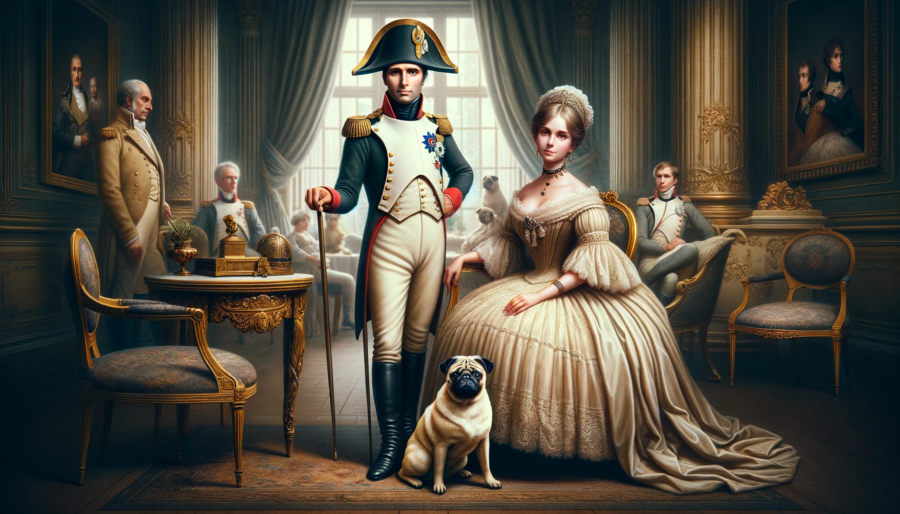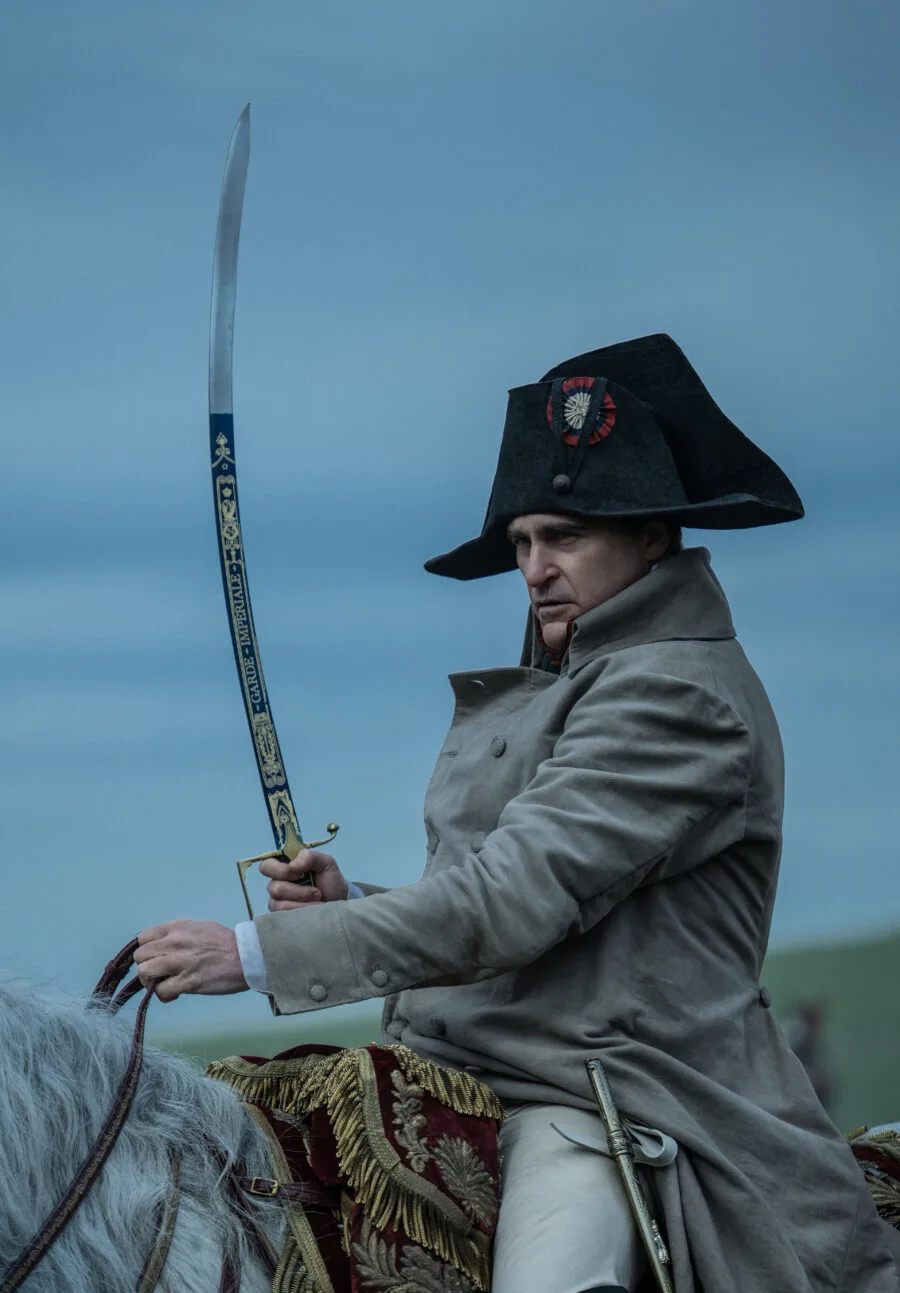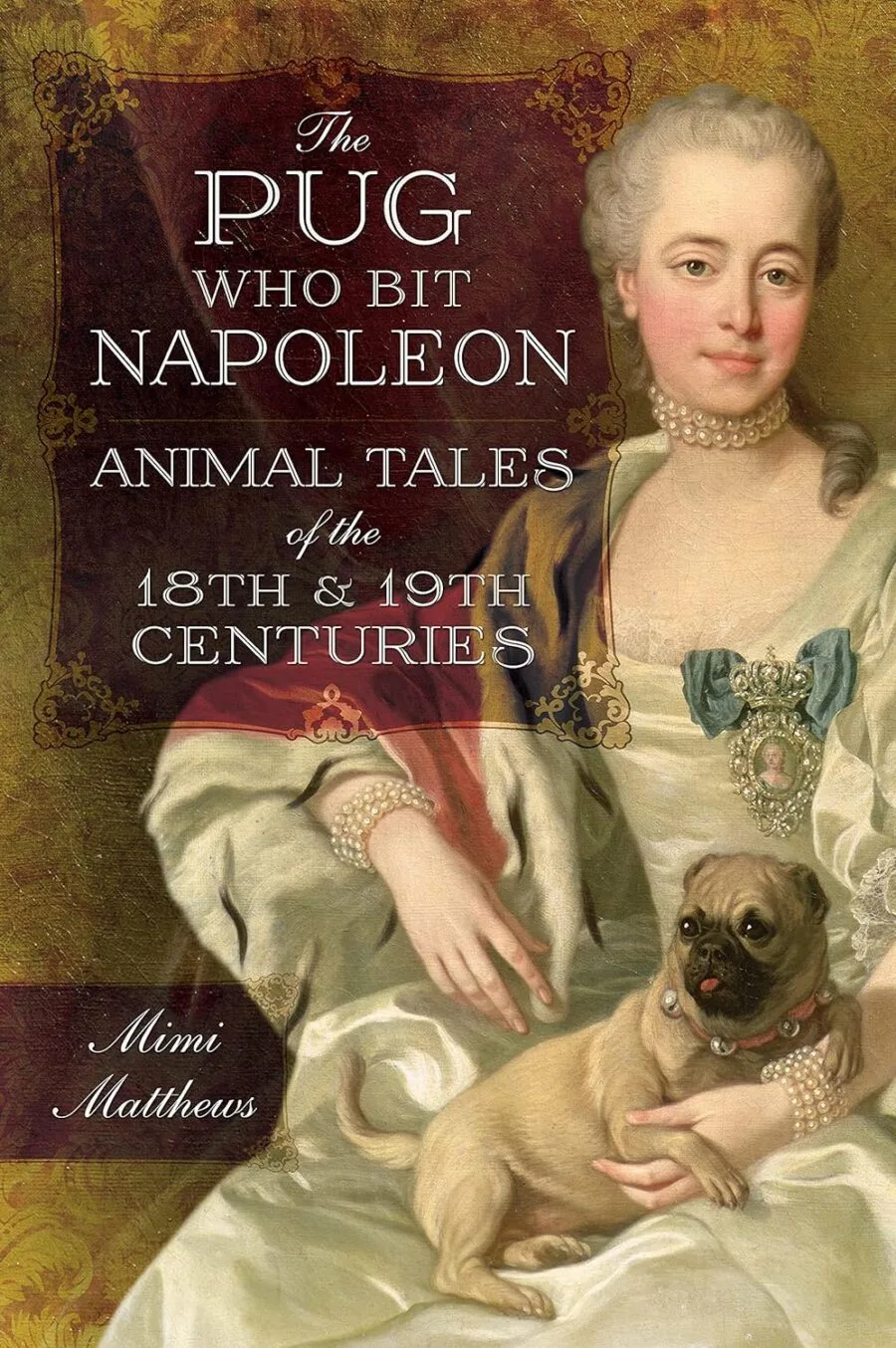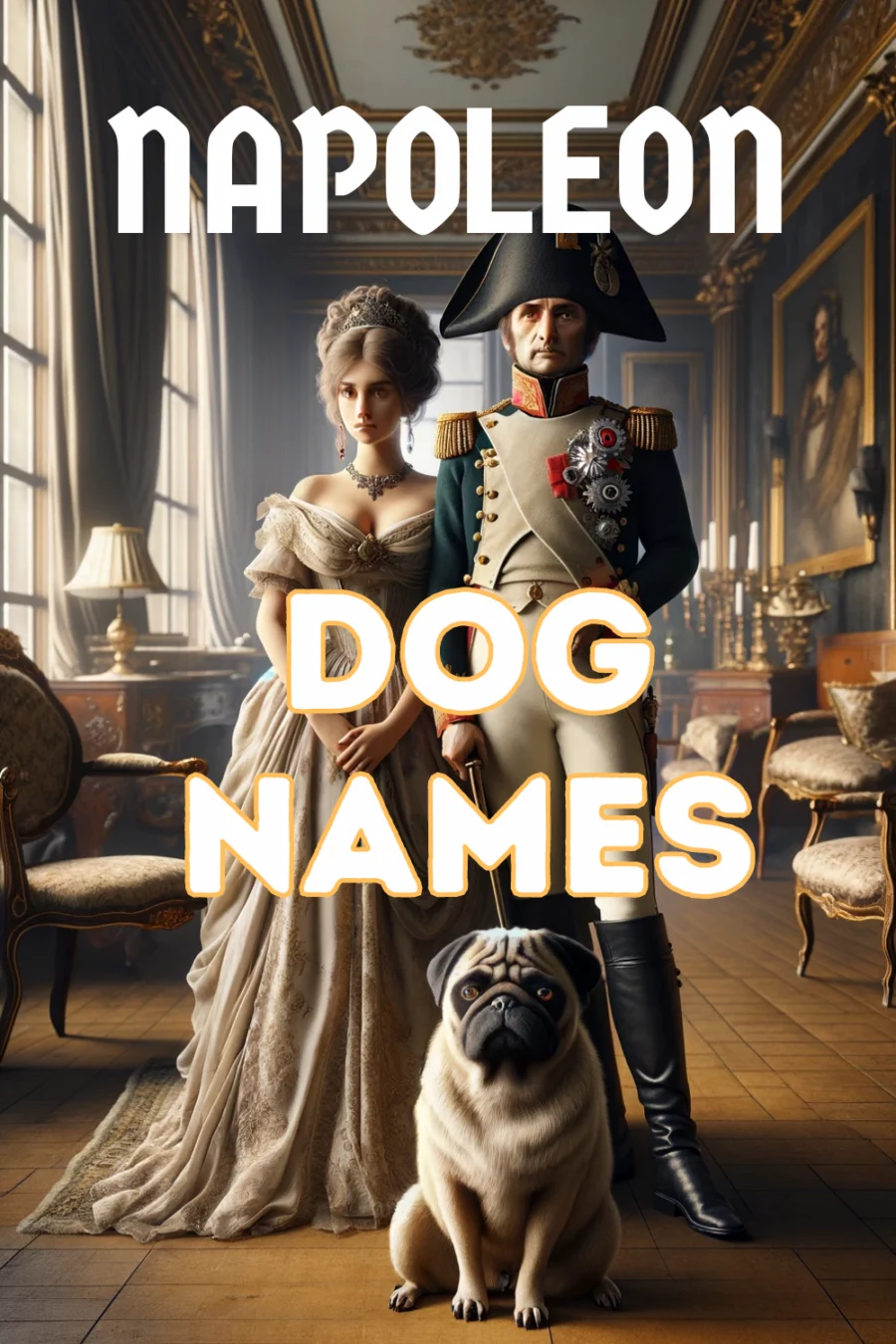Whether you are inspired by military history or by the Joaquin Phoenix movie, there’s no doubt that Napoleon dog names appeal to many. Drawing from the rich tapestry of his life, from his military moves to his formidable presence in European history, these names reflect the unique characteristics associated with Napoleon, whether to capture the tenacity and boldness of this iconic leader or to bring a touch of regal and commanding aura to your new dog.

Most Popular Napoleon Dog Names
Napoleon – It’s believed to be of Italian origin, particularly from the Italian name “Napoleone,” which was relatively common in Italy during the Middle Ages. The name “Napoleone” itself is thought to have been derived from the Greek “Neapolis,” meaning “new city,” which is the Greek name for the city of Naples in Italy. Today, the name often connotes strong leadership, strategic acumen, and, sometimes, overreaching ambition, due to Napoleon Bonaparte’s legacy.

Joaquin Phoenix in “Napoleon,” premiering in theaters around the world on November 22, 2023. Photo courtesy Apple TV+
Bonaparte – The surname “Bonaparte” carries with it a significant historical weight and meaning, deeply rooted in European history. Originating from Corsica, an island that was under Genoese control before becoming French, the name is thought to have Italian origins. The prefix “Buona” translates to “good” in Italian, while “Parte” could be interpreted as “part” or “side.” Hence, “Bonaparte” could be construed as meaning “good side” or “good part.” The name Bonaparte, now transcending its potential original meaning, has come to symbolize a period of dramatic change, conquest, and the rise from relatively humble origins to the pinnacle of power, mirroring Napoleon’s own journey from Corsican obscurity to European dominance.
Josephine – A name of French origin, derived from the Hebrew name Yosef, meaning “Jehovah increases” or “God shall add.” Josephine became notably popular in Western cultures, in part due to Empress Joséphine de Beauharnais, the first wife of Napoleon Bonaparte and the first Empress of the French. Her elegance, style, and role in the Napoleonic era made her a prominent historical figure. The name Josephine is often associated with grace, cultural influence, and resilience, reflecting Empress Joséphine’s impact on French society and her enduring legacy in history and fashion.

Fortuné – The name of the Pug belonging to Joséphine de Beauharnais, the first wife of Napoleon Bonaparte. The name “Fortuné” is of French origin, meaning “fortunate” or “blessed with luck.” In historical context, Fortuné is best remembered for his close bond with Joséphine and an amusing incident where he bit Napoleon on the couple’s wedding night.
Emperor: Title held by Napoleon as ruler of France.
Empress: Title held by Joséphine and Marie Louise, wives of Napoleon.
Famous Animals Named Napoleon
Napoleon – The film Napoleon, released in 1995, is an Australian family movie that tells the story of a young Golden Retriever puppy named Napoleon who dreams of leaving his suburban Sydney home to experience wild adventures. The movie follows Napoleon as he embarks on a journey that leads him into various encounters with different animals and challenges.
Napoleon – The pig from George Orwell’s novel Animal Farm.
Napoleon – A bloodhound from Disney’s The Aristocats.
Names Related to Napoleon
- Ableiges: Site of a skirmish during the French Revolutionary Wars.
- Austerlitz: Location of one of Napoleon’s most famous victories.
- Barras: Paul Barras, a leading figure during the French Revolution who played a role in Napoleon’s rise.
- Beauharnais: Joséphine de Beauharnais, Napoleon’s first wife.
- Berezina: River crossed by Napoleon’s army in a difficult retreat from Russia.
- Bernadotte: Jean-Baptiste Bernadotte, one of Napoleon’s generals who later became King of Sweden.
- Bonaparte: Napoleon’s family name.
- Boney: The British nickname for Napoleon.
- Borghese: Related to Napoleon through his sister’s marriage to Camillo Borghese.
- Borodino: A major battle during the Russian campaign.
- Brienne: Town where Napoleon attended military school.
- Brumaire: The coup of 18 Brumaire brought Napoleon to power.
- Cairo: City Napoleon captured during the Egyptian campaign.
- Cambronne: Pierre Cambronne, a general known for his bravery at Waterloo.
- Canino: Principality granted to Napoleon’s brother Lucien.
- Caroline: Napoleon’s sister, married to Joachim Murat.
- Castiglione: Battle where Napoleon defeated the Austrians.
- Cleopatra’s Needles: Monoliths Napoleon brought back from Egypt.
- Corsica: Napoleon’s birthplace.
- Davout: Louis-Nicolas Davout, one of Napoleon’s most talented marshals.
- Desaix: Louis Charles Antoine Desaix, a trusted general of Napoleon.
- Duroc: Géraud Duroc, close aide and friend of Napoleon.
- Egypt: Site of Napoleon’s military campaign in 1798-1799.
- Elba: Island where Napoleon was first exiled.
- Eugène: Napoleon’s stepson, son of Empress Joséphine.
- Fontainebleau: Palace where Napoleon abdicated for the first time.
- Fortuné: Joséphine’s pet dog.
- Fouché: Joseph Fouché, Napoleon’s police chief.
- Fox: British ship involved in Napoleon’s final surrender.
- Francis: Francis II, Holy Roman Emperor and adversary of Napoleon.
- Friedland: Battle where Napoleon defeated the Russians.
- Giuseppe: Napoleon’s brother Joseph Bonaparte, King of Naples and Spain.
- Grouchy: Emmanuel de Grouchy, marshal under Napoleon.
- Hortense: Daughter of Joséphine, Queen of Holland.
- Iena: Battle of Jena-Auerstedt where Napoleon defeated Prussia.
- Illyrian: Provinces ruled by French during Napoleon’s reign.
- Jaffa: City captured by Napoleon during the Egyptian campaign.
- Jerome: Napoleon’s youngest brother, King of Westphalia.
- Josephine: Napoleon’s first wife, Empress of France.
- Joubert: Barthélemy Catherine Joubert, French general.
- Junot: Andoche Junot, a general under Napoleon.
- Kutuzov: Russian general who opposed Napoleon.
- Lannes: Jean Lannes, one of Napoleon’s most trusted marshals.
- Las Cases: Emmanuel de Las Cases, author of the “Mémorial de Sainte-Hélène.”
- Leipzig: Site of the Battle of Nations, Napoleon’s defeat.
- Lodi: Battle where Napoleon’s troops crossed the Lodi Bridge.
- Louis: Napoleon’s brother, King of Holland.
- Lucien: Napoleon’s brother, an influential politician.
- Luneville: Treaty of Lunéville, signed under Napoleon’s rule.
- Marengo: Marengo was the famous gray Arabian horse of Napoleon Bonaparte.
Did you know? Napoleon actor Joaquin Phoenix has lent his voice and influence to various animal rights organizations, participated in documentaries highlighting the plight of animals in industries like factory farming and the Chinese dog leather industry. He has used his public appearances to raise awareness about animal cruelty and the benefits of a plant-based lifestyle.
- Maria-Louisa: Napoleon’s second wife, Empress of France.
- Marmont: Auguste de Marmont, a marshal under Napoleon.
- Masséna: André Masséna, one of Napoleon’s most capable marshals.
- Menou: Jacques de Menou, general in the Egyptian campaign.
- Metternich: Austrian diplomat who played a key role in Napoleon’s downfall.
- Moncey: Bon-Adrien Jeannot de Moncey, a marshal of France under Napoleon.
- Montebello: Battle of Montebello, part of the Italian campaigns.
- Moreau: Jean Victor Marie Moreau, a rival general to Napoleon.
- Murat: Joachim Murat, Napoleon’s brother-in-law and King of Naples.
- Ney: Michel Ney, one of Napoleon’s most famous marshals.
- Nile: Reference to the Battle of the Nile, a naval defeat for Napoleon.
- Pauline: Napoleon’s sister, known for her beauty and influence.
- Prussia: A key adversary of Napoleon during his reign.
- Pyramids: Battle of the Pyramids, a major victory in Egypt.
- Quiberon: Linked to the Quiberon expedition, part of the French Revolutionary Wars.
- Rivoli: Battle of Rivoli, where Napoleon defeated the Austrians.
- Robespierre: Maximilien Robespierre, a revolutionary figure during Napoleon’s rise.
- Rochefort: The town from which Napoleon attempted to escape to America.
- Russia: Reference to Napoleon’s disastrous Russian campaign.
- Saint Cloud: Site of Napoleon’s coup d’état of 18 Brumaire.
- Saint Helena: Island of Napoleon’s final exile.
- Savary: Anne Jean Marie René Savary, a general and diplomat under Napoleon.
- Schönbrunn: Palace where Napoleon stayed during the Austrian campaign.
- Sebastiani: François Horace Bastien Sebastiani, one of Napoleon’s generals.
- Sieyès: Abbé Sieyès, a key figure in the coup that brought Napoleon to power.
- Soult: Nicolas Jean-de-Dieu Soult, a marshal under Napoleon.
- Spain: Site of a challenging campaign for Napoleon.
- Stael: Germaine de Staël, a famous writer who opposed Napoleon.
- Talleyrand: Charles Maurice de Talleyrand, a prominent diplomat under Napoleon.
- Tilsit: Treaty of Tilsit, between Napoleon and Russia/Prussia.
- Trafalgar: Naval battle where the British defeated Napoleon’s forces.
- Turreau: Louis Marie Turreau, a general under Napoleon.
- Ulm: Battle of Ulm, a strategic victory for Napoleon.
- Valmy: Battle of Valmy, a turning point in the French Revolutionary Wars.
- Vandamme: Dominique-Joseph René Vandamme, a general under Napoleon.
- Venice: City Napoleon captured during his Italian campaign.
- Verdun: Treaty of Verdun under Napoleon’s rule.
- Victor: Claude Victor-Perrin, a marshal of Napoleon.
- Villeneuve: Pierre-Charles Villeneuve, French admiral during the Napoleonic Wars.
- Wagram: Battle of Wagram, a major victory for Napoleon.
- Waterloo: Napoleon’s final battle and defeat.
- Wellington: Duke of Wellington, Napoleon’s adversary at Waterloo.
- Wurmser: Dagobert Sigismund von Wurmser, an Austrian field marshal defeated by Napoleon.
- Xeres: Reference to the French occupation of Spain.
- Yash: A region affected by Napoleon’s campaigns in Eastern Europe.
- Yusuf: Name reminiscent of Napoleon’s Egyptian campaign.
- Zaragoza: Site of fierce battles during the Peninsular War.
- Znaim: Location of an armistice between Austria and Napoleon.
- Zubov: Count Nikolay Zubov, Russian noble during Napoleon’s era.
More Dog Names You Might Like
400 French Dog Names {and their meanings!}
150+ Army Dog Names for Your K-9
Italian Dog Names – Fantastico Names for Your Fido!
Pin it to remember

- Review: Jimmy BX7 Pro Anti-Mite Vacuum Cleaner - December 16, 2024
- 🎉 GIVEAWAY: Lord of the Pets Portrait of Your Dog! - November 26, 2024
- Review: Lord of the Pets Portraits - November 17, 2024
